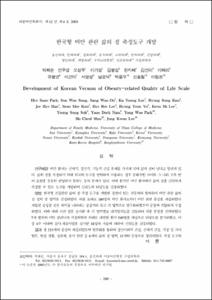KUMEL Repository
1. Journal Papers (연구논문)
1. School of Medicine (의과대학)
Dept. of Family Medicine (가정의학)
한국형 비만 관련 삶의 질 측정도구 개발
- Affiliated Author(s)
- 서영성
- Alternative Author(s)
- Suh, Young Sung
- Journal Title
- 대한비만학회지
- ISSN
- 1226-4407
- Issued Date
- 2003
- Abstract
- Objective: Obesity researchers have a growing interest in measuring the impact of weight and weight reduction on quality of life. The KOQOL (Korean version of Obesity-related QOL scale) was the self-report instrument specifically developed to assess the effect of obesity on quality of life reflecting Korean’s own language expression and culture. This report was conducted to establish verification of the reliability and validity of a 15-item version of the KOQOL.
Methods: Symptom descriptions related with obesity were collected from 180 obese people based on definition and domains of ‘obesity related quality of life’. The collected results were categorized into each domain and edited to be used as questions. The expert panels established final 6 domains, 15 items, and item option responses. Reliability was tested by internal consistency method and 2 weeks test-retest method. Validity test was performed by factor analysis and clinical validity.
Results: A total of 215 symptom descriptions were collected and categorized into 15 items of 6 domains including phychosocial health, physical health, work, routine life, sexual life, and diet distress. Items were corrected for more precise meaning, concise sentence, and proper expression. A high degree of internal consistency was observed for each of domain except routine life. Two weeks test-retest reliability correlation coefficients scores were highly significant in all domains. Item-to-scale and item-to total score correlations were highly significant for all items. A principal components analysis identified 3 factors with strong support for the adequacy of the scale structure. Significant differences in KOQOL scale and total scores were found among groups differing in body mass index or abdominal circumference, supporting the utility of the KOQOL. Conclusion: The KOQOL composed of 15 items of 6 domains (phychosocial health, physical health, work, routine life, sexual life, and diet distress) was demonstrated as an excellent tool for measuring of obesity related quality of life. The KOQOL appears to be a reliable and clinically valid brief measure of quality of life in Korean obese persons.
연구배경: 비만 환자는 신체적, 정신적, 기능적 건강 문제를 가지게 되며 삶의 질이 낮다고 알려져 있다. 삶의 질을 측정하기 위해 외국의 도구를 번역하여 사용하는 경우 문화적인 차이와 그 나라 고유 언어 표현을 충분히 반영하지 못하는 등의 문제가 있다. 이에 한국인 비만 환자에서 삶의 질을 간편하게 측정할 수 있는 도구를 개발하여 신뢰도와 타당도를 검증하였다.
방법: 한국형 건강관련 삶의 질 측정 도구를 개발한 경험이 있는 전문의와 협의하여 비만 관련 삶의 질 정의 및 영역을 설정하였다. 이를 토대로 180명의 비만 환자로부터 비만 관련 증상을 채집하였다. 채집된 증상을 같은 의미를 나타내는 증상끼리 묶고 각 영역으로 범주화하였으며 문항에 적합하게 수정하였다. 이에 대해 사전 설문 조사한 후 각 영역별로 내적일치도를 검토하여 최종 문항을 선택하였다. 7개 병원의 비만 클리닉과 가정의학과 외래로 내원한 환자 240명을 대상으로 타당도를 분석하였고, 이 중 4주 이내에 검사-재검사법을 실시한 38명의 자료에 대하여 신뢰도를 검증하였다.
결과: 총 215개의 증상이 채집되었으며 범주화를 통하여 정신사회적 건강, 신체적 건강, 직장 및 가사 업무, 일상 생활, 성관계, 음식 관련 등 6개의 삶의 질 영역, 15개의 문항으로 정리되었다. 측정 도구의 내적 일치도가 비교적 높게 나타났고 검사-재검사법에 의한 상관 계수도 유의하게 높게 나타났으며, 문항-영역간, 문항-총점간 상관성도 모든 문항에서 유의성을 나타내었다. 요인 분석 결과는 3개의 요인으로 묶여 비만 관련 삶의 질을 측정하기에 타당도가 있는 것으로 나타났다. 삶의 질 각 영역별 점수는 모든 영역에서 비만군 및 복부 비만군과 대조군 사이에 유의한 차이가 있는 것으로 나타났다.
결론: 6 영역, 15 문항으로 구성된 한국형 비만 관련 삶의 질 측정도구를 개발하였으며 이 도구는 신뢰도와 타당도가 높은 것으로 나타났다. 한국인 비만 환자에게 간편하게 사용할 수 있을 것으로 여겨지며 추후 지속적인 개정 작업이 필요하다.
- Alternative Title
- Development of Korean Version of Obesity-related Quality of Life Scale
- Department
- Dept. of Family Medicine (가정의학)
- Publisher
- School of Medicine
- Citation
- 박혜순 et al. (2003). 한국형 비만 관련 삶의 질 측정도구 개발. 대한비만학회지, 12(4), 280–292.
- Type
- Article
- ISSN
- 1226-4407
- Appears in Collections:
- 1. School of Medicine (의과대학) > Dept. of Family Medicine (가정의학)
- 파일 목록
-
-
Download
 oak-bbb-1470.pdf
기타 데이터 / 392.92 kB / Adobe PDF
oak-bbb-1470.pdf
기타 데이터 / 392.92 kB / Adobe PDF
-
Items in Repository are protected by copyright, with all rights reserved, unless otherwise indicated.